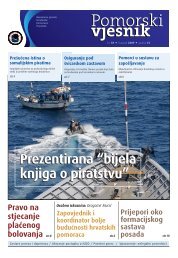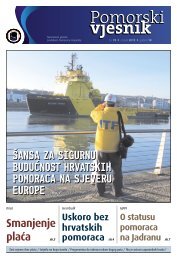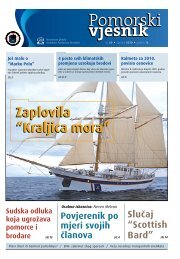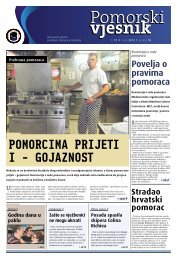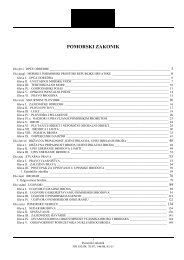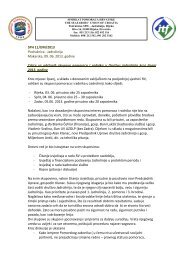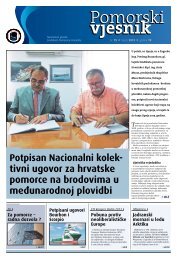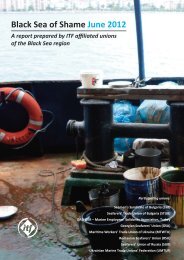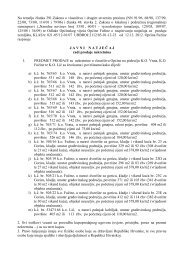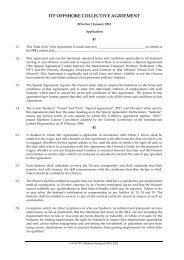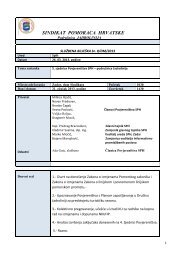Konvencija o radu pomoraca, 2006 (engleski i hrvatski jezik)
Konvencija o radu pomoraca, 2006 (engleski i hrvatski jezik)
Konvencija o radu pomoraca, 2006 (engleski i hrvatski jezik)
Create successful ePaper yourself
Turn your PDF publications into a flip-book with our unique Google optimized e-Paper software.
of appropriate quality, nutritional value and quantity that adequately covers the requirements of the ship<br />
and takes into account the differing cultural and religious backgrounds.<br />
2. Seafarers on board a ship shall be provided with food free of charge during the period of<br />
engagement.<br />
3. Seafarers employed as ships’ cooks with responsibility for food preparation must be trained and<br />
qualified for their position on board ship.<br />
Standard A3.2 - Food and catering<br />
1. Each Member shall adopt laws and regulations or other measures to provide minimum standards for<br />
the quantity and quality of food and drinking water and for the catering standards that apply to meals<br />
provided to seafarers on ships that fly its flag, and shall undertake educational activities to promote<br />
awareness and implementation of the standards referred to in this paragraph.<br />
2. Each Member shall ensure that ships that fly its flag meet the following minimum standards:<br />
(a) food and drinking water supplies, having regard to the number of seafarers on board, their religious<br />
requirements and cultural practices as they pertain to food, and the duration and nature of the voyage,<br />
shall be suitable in respect of quantity, nutritional value, quality and variety;<br />
(b) the organization and equipment of the catering department shall be such as to permit the provision to<br />
the seafarers of adequate, varied and nutritious meals prepared and served in hygienic conditions; and<br />
(c) catering staff shall be properly trained or instructed for their positions.<br />
3. Shipowners shall ensure that seafarers who are engaged as ships’ cooks are trained, qualified and<br />
found competent for the position in accordance with requirements set out in the laws and regulations of<br />
the Member concerned.<br />
4. The requirements under paragraph 3 of this Standard shall include a completion of a training course<br />
approved or recognized by the competent authority, which covers practical cookery, food and personal<br />
hygiene, food storage, stock control, and environmental protection and catering health and safety.<br />
5. On ships operating with a prescribed manning of less than ten which, by virtue of the size of the crew<br />
or the trading pattern, may not be required by the competent authority to carry a fully qualified cook,<br />
anyone processing food in the galley shall be trained or instructed in areas including food and personal<br />
hygiene as well as handling and storage of food on board ship.<br />
6. In circumstances of exceptional necessity, the competent authority may issue a dispensation permitting<br />
a non-fully qualified cook to serve in a specified ship for a specified limited period, until the next<br />
convenient port of call or for a period not exceeding one month, provided that the person to whom the<br />
dispensation is issued is trained or instructed in areas including food and personal hygene as well as<br />
handling and storage of food on board ship.<br />
7. In accordance with the ongoing compliance procedures under Title 5, the competent authority shall<br />
require that frequent documented inspections be carried out on board ships, by or under the authority of<br />
the master, with respect to:<br />
(a) supplies of food and drinking water;<br />
(b) all spaces and equipment used for the storage and handling of food and drinking water; and<br />
166



